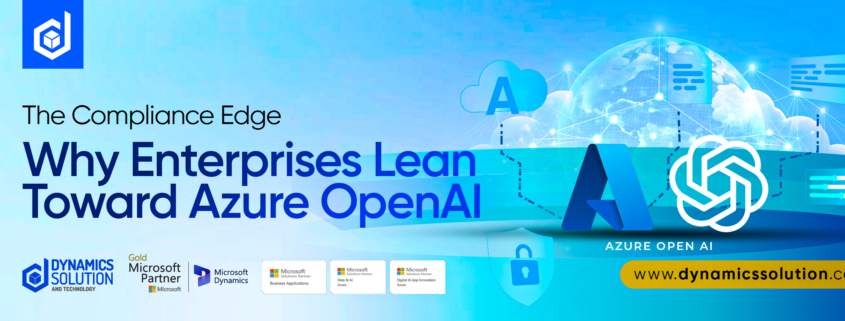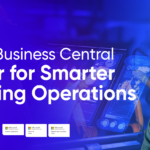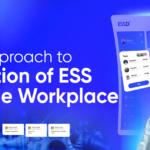Generative AI (Gen AI) has transformed the way organizations handle content creation, customer engagement and data analytics. Enterprises increasingly leverage Large Language Models (LLMs) such as OpenAI’s GPT series to automate workflows, generate insights and enhance user experiences.
However, with great power comes great responsibility. The potential for data breaches, regulatory fines and reputational damage has never been higher. To address these concerns, Microsoft collaborated with OpenAI to launch Microsoft Azure OpenAI Service, a cloud‑native offering that embeds OpenAI’s advanced models into Azure’s enterprise‑grade framework.
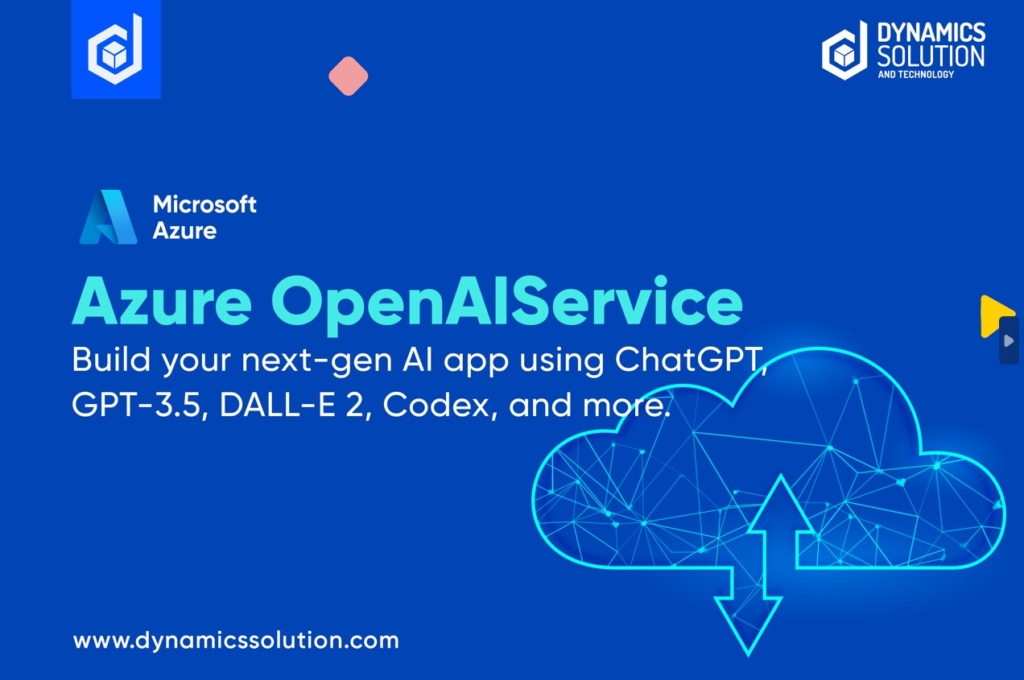
This collaboration allows businesses to tap into GPT‑4, GPT‑3.5, Codex and DALL·E models through the familiar Azure portal, backed by Microsoft’s global infrastructure, robust security and deep compliance commitments.
Let’s explore further why businesses are increasingly choosing Azure OpenAI to power their AI initiatives and how its compliance-first architecture sets it apart.
Why Compliance is the New Competitive Edge for AI Adoption?
The Importance of Compliance in Enterprise AI
Organizations across finance, healthcare and government sectors face rigorous data protection regulations such as GDPR in Europe, HIPAA in the US and various regional privacy laws that carry direct penalties for non-compliance.
Enterprises must ensure any AI service they integrate does not expose sensitive data or inadvertently violate regulatory mandates. Under these constraints, AI projects can stall or fail unless the underlying platform provides ironclad compliance guarantees.
The Cost of Non-compliance
Data breaches and regulatory fines can cost organizations millions of dollars, alongside reputational damage and lost customer trust. A breach exposing personal data can result in fines up to 4% of annual global turnover under GDPR. Beyond direct financial penalties, non-compliance can erode competitive differentiation, as customers and partners increasingly demand demonstrations of secure data governance.
How Microsoft Azure OpenAI Elevates Compliance?
Compliance isn’t an afterthought; it’s woven into the fabric of the service, inheriting the strong posture of the underlying Azure platform as we have defined below.
1. Enterprise-grade Security and Data Protection
Microsoft Azure OpenAI operates entirely within Azure’s global infrastructure, benefiting from multi-layered security measures such as encryption at rest and in transit, hardware-based root of trust and continuous threat monitoring.
Unlike standard OpenAI endpoints, where data may be processed outside your own tenancy, all inputs and outputs in Azure OpenAI remain within the customer’s subscription boundary, ensuring that no unauthorized party, including Microsoft, can access your data.
2. Industry‑leading Compliance Certifications
Azure maintains more than 100 compliance certifications spanning ISO 27001, SOC 1/2/3, HIPAA, FedRAMP and more, providing enterprises with assurance that Azure OpenAI meets the strict regulatory requirements. This broad certification portfolio simplifies audit processes and accelerates time-to-market for AI applications in regulated industries.
3. Regional Availability and Data Residency Controls
With Azure OpenAI available in over 60 Azure regions worldwide, organizations can ensure data residency aligns with local laws and corporate policies. Private Link integration and isolated virtual networks allow customer traffic to stay within defined network perimeters, mitigating exposure to the public internet and aligning with data sovereignty mandates.
OpenAI vs. Azure OpenAI Service
OpenAI and Azure OpenAI Service expose the same family of powerful Generative AI models, yet they differ markedly in how they handle data governance, pricing, performance, integration and enterprise support.
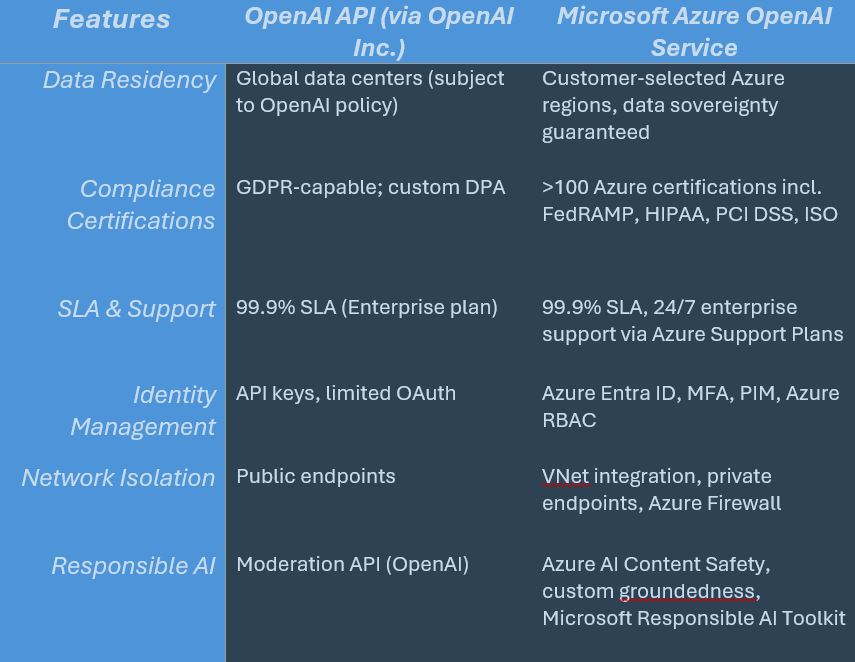
Responsible AI and Governance Controls
As enterprises increasingly adopt AI technologies, ensuring responsible and ethical use becomes crucial. That is why Microsoft Azure OpenAI Service is designed with built-in governance controls to help organizations deploy AI solutions that align with ethical standards.
Built‑in Content Filtering and Misuse Monitoring
To prevent the generation of harmful or biased content, Azure OpenAI incorporates Microsoft’s content filtering and abuse detection systems. These mechanisms screen both prompts and model outputs to flag or block disallowed content such as hate speech, violence or PII (Personally Identifiable Information) leaks, and can be tailored to organizational policies. Customers also have the option to adjust filtering parameters to balance safety with business needs.
Role‑based Access and Auditability
Azure OpenAI leverages Azure Active Directory for fine-grained Role-based Access Control (RBAC), ensuring only authorized users and applications can invoke models or manage resources. Comprehensive logging through Azure Monitor captures operation traces, prompts and usage metrics, forming a verifiable audit trail that supports internal governance and external audits.
Integration with the Azure Ecosystem for a Unified Compliance Framework
As part of Microsoft’s broader compliance strategy, it works seamlessly with other Azure governance and security tools to provide a unified compliance framework across identity, policy and threat protection.
Private Link and Virtual Network Integration
Azure Private Link provides secure, private connectivity from virtual networks to Azure OpenAI instances, eliminating public endpoints and ensuring data never traverses the public internet. This integration is critical for organizations with strict network isolation requirements, such as defense contractors or financial institutions.
Seamless Integration with Azure Policy and Defender for Cloud
Enterprises can apply Azure Policy to enforce organizational standards such as restricting regions or SKU (Stock Keeping Unit) tiers to their Azure OpenAI resources, preventing misconfigurations before they occur.
Additionally, Microsoft Defender for Cloud offers AI-driven security recommendations, vulnerability assessments and compliance posture scoring, extending protection across AI workloads and underlying infrastructure.
Enterprises Trust Microsoft Azure OpenAI
Enteprises are innovating with Azure OpenAI Service. Here are some renowned use cases below.
PwC Scales Generative AI For Consulting
PwC integrated Azure OpenAI Service into its data-driven auditing and consulting workflows, automating report generation and accelerating insights delivery. By leveraging Azure’s compliance certifications, PwC ensured client data remained secure and audit-ready, reducing manual processing times while maintaining regulatory compliance.
JERA Drives Data‑driven Energy Operations
JERA, a leading power producer, built proprietary AI models on Azure OpenAI to optimize power plant maintenance schedules. Using isolated virtual networks and RBAC, JERA safeguarded operational data while harnessing GPT models for predictive insights; demonstrating how compliance-conscious deployments can unlock business value without sacrificing security.
How to Ensure Compliance from Day One?
- Set up Azure OpenAI with compliance in mind
- Provision within a dedicated subscription or resource group to isolate AI workloads.
- Enable Private Link to restrict network paths exclusively to your VNet.
- Define RBAC roles aligned to your organizational hierarchy, granting least-privilege permissions.
- Activate diagnostic logs and forward them to Azure Monitor or a SIEM solution for real-time auditing.
- Apply Azure Policy definitions to automatically enforce naming conventions, SKU restrictions and region limits.
Each of these steps leverages built-in Azure services, ensuring your Microsoft Azure OpenAI deployment adheres to enterprise security and compliance frameworks from the outset.
Kickstart Your AI Journey with Dynamics Solution and Technology
In regulated industries, the path to AI innovation is paved with stringent compliance guardrails. Microsoft Azure OpenAI Service dismantles these barriers by combining OpenAI’s advanced language models with Azure’s trusted security, exhaustive compliance certifications and integrated governance tools.
Enterprises that adopt this, gain not only a performance advantage but also the assurance that their AI initiatives align with the highest standards of data protection and regulatory adherence. By embedding compliance into every layer, it delivers the critical edge that enterprises need to innovate securely and confidently.
As a proud Microsoft Gold Partner, Dynamics Solution and Technology recognizes that Artificial Intelligence is a transformative force reshaping how businesses operate. By embracing a principled approach to AI, we ensure that organizations harness its power responsibly and effectively.
Partner with us to embrace AI responsibly and unlock the full potential of Gen AI for a brighter and more innovative future. Contact us to book your consultancy.

